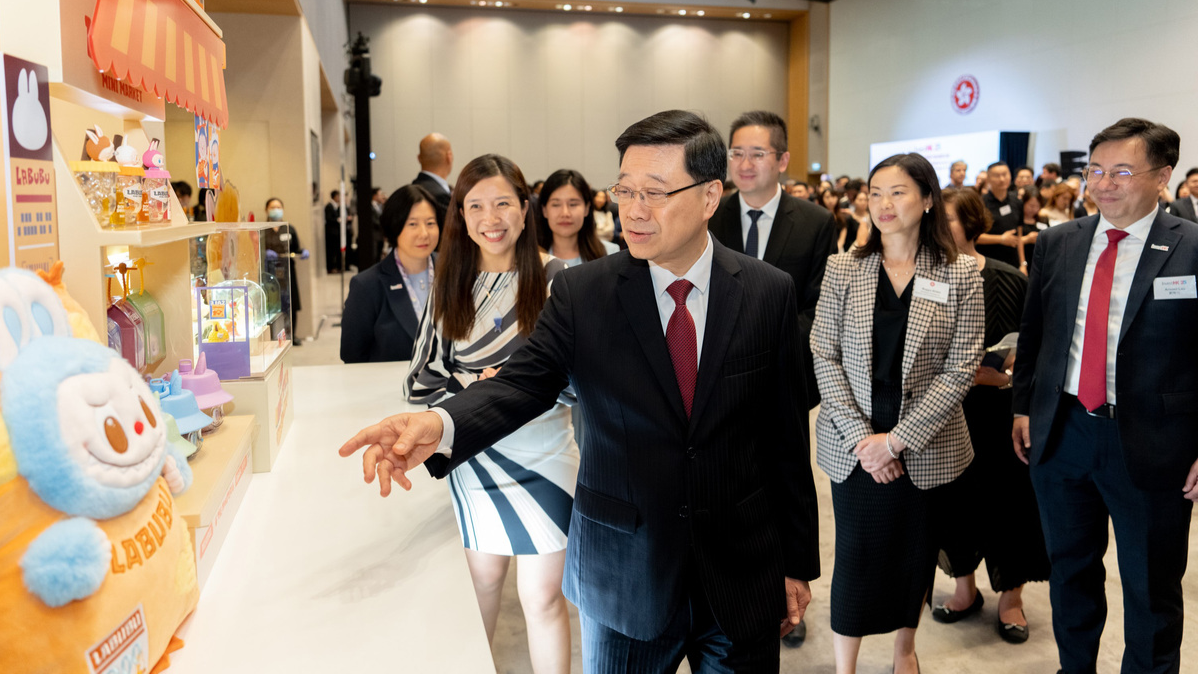
Hong Kong Chief Executive John Lee Ka-chiu said that the establishment of deeper economic and emotional bonds with the Chinese mainland are pivotal achievements of his administration, and have bolstered the city’s competitiveness and increased people’s happiness.
During a video interview provided by the Hong Kong SAR government on Thursday, Lee said there has been increased engagement between Hong Kong and Guangdong residents over recent years — a trend that can be seen in the high number of cross-border travels.
Lee said he is glad to see more Hong Kong residents going to the Chinese mainland during weekends or holidays for leisure, adding that improving the happiness of residents is a key focus of his governance.
READ MORE: Hong Kong facilitates mainland startups’ global expansion
Meanwhile, the number of mainland tourists visiting Hong Kong has been increasing rapidly, which has not only increased people-to-people interactions, but also brought tangible economic benefits to Hong Kong, Lee said.
The city logged about 4.08 million visitor arrivals in May, a 20 percent year-on-year increase. Among the 20 million inbound visitor trips made from January through May, 15.2 million were from the mainland, representing a 10-percent year-on-year increase.
In addition to the increase in people-to-people exchanges, Hong Kong’s economic cooperation with Guangdong has also reached new heights, Lee said.
A notable achievement over the past three years has been the establishment of the Hong Kong International Airport (HKIA) Dongguan Logistics Park. The park has streamlined the customs clearance system for mainland cargo intended for export through the HKIA.
This innovative sea-air transshipment model — which enables mainland cargo to undergo security screening and palletization in Dongguan and then be directly shipped to HKIA via a waterway — not only enhances transport efficiency while saving time and costs for shippers but also generates significant mutual economic benefits, reinforcing the city's decades-long dominance in global airfreight, Lee said.
The Hetao Shenzhen-Hong Kong Science and Technology Innovation Cooperation Zone is another flagship platform creating cross-border synergy, Lee said.
He said the initiative combines Hong Kong's technology and digital competitiveness, which were ranked third and seventh globally, respectively, with Shenzhen's research strengths now within an integrated innovation ecosystem.
The chief executive pledged to expand such collaborations to more areas to consolidate win-win economic partnerships between Hong Kong and the mainland.
Lee also reaffirmed his commitment to exploring overseas opportunities for Hong Kong, citing his multiple trips to the Middle East and Southeast Asia over the past two years.
The Association of Southeast Asian Nations (ASEAN) is Hong Kong’s second-largest trading partner, and Middle East countries are interested in investing in the Hong Kong and mainland markets, Lee said.
Hong Kong has reached cooperation agreements with partners in the two regions as a result of these visits, Lee said, adding that the government will continue to invite more officials and entrepreneurs from the two regions to come and see Hong Kong’s advantages in person.
Reviewing other major achievements of his administration, Lee said the average waiting times for public housing have been reduced from 6.1 to 5.3 years since he took office, with 9,000 Light Public Housing units — built using the Modular Integrated Construction approach as transitional residences to fill the short-term gap in supply — scheduled to be occupied this year.
Lee also highlighted the significant enhancements to the city’s national security, achieved through legislation and law enforcement.
READ MORE: Mainland broker gets HK nod for cryptocurrency trading
He cautioned about evolving national security threats as new technologies such as artificial intelligence (AI) emerge, and said his administration would continue to refine legal mechanisms and enhance national security education.
He said the 1,100-square-meter National Security Exhibition Gallery — opened in August 2024 — educates residents about 20 security dimensions, from food safety to financial safety. The national security reporting hotline also receives a high number of reports from within the community, and forms a critical component in the city’s efforts to safeguard national security, Lee added.
Lee’s administration will enter its fourth year in office on July 1.
Contact the writer at stephyzhang@chinadailyhk.com


